California Repeals Anti-Prostitution Loitering Law
January 1, 2023
SB 357, otherwise known as the Safer Streets for All Act, has officially gone into effect in California. The bill repealed California Penal Code § 653.22, which criminalized the act of loitering with “intent to commit prostitution.”
Archaic anti-sex work loitering laws are common around the United States.
What is Loitering for the Purpose of Prostitution?
Loitering for the purpose of prostitution (LPP) laws exist in multiple states across the U.S. They make wandering, remaining, or spending time in a public space with the “intent to promote or commit prostitution” a crime. Behavior indicative of this “intent” can include beckoning or attempting to speak to passing pedestrians and motorists, but a 2019 study conducted through the Los Angeles County Public Defender’s office found that under California’s LPP law, other causes for arrest typically included an individual’s presence in an area known for sex work, their clothing, possession of a cell phone, possession of cash, or reacting to the presence of police.
These types of laws are discriminatory by nature, as they encourage law enforcement to profile and arrest individuals based on their race, gender, and/or stereotypes of what a sex worker looks like. By criminalizing intent, rather than action, LPP laws allow police to enforce violations at their own biased discretion, which threatens equal prosecution under the law.
Who do LPP laws affect?
Unsurprisingly, LPP laws are used to target marginalized groups, especially transgender women of color. The Sylvia Rivera Law Project, based in New York City, found that 80% of their clients who identified as transgender women of color had experienced police harassment or false arrest based on suspicion of prostitution.
According to the ACLU, black adults made up over 50% of individuals arrested in Los Angeles under California’s LPP law, despite only representing 8.95% of the city’s population.
Senator Scott Wiener, author of SB 357, denounced California’s LPP law in a Tweet last year, stating the following:
“An officer can arrest someone based on how they look. Arrests target trans women/women of color.”
Roxanne, a transgender San Jose attorney who goes only by her first name, lived this experience herself. In July 2019, she was out for a walk in her neighborhood when law enforcement approached and arrested her without explanation.
They processed her at Santa Clara County jail, where officers denied her request to be held with other transgender women and instead booked her as a man. It wasn’t until the next morning, after being held in a filthy cell and ridiculed by jail staff all night, that she learned what her charges were: Loitering with intent to commit prostitution.
Roxanne has stated that she’s used to being harassed by police. In an interview with Mercury News, she said:
“The jailing was new, but the harassment is routine. A lot of our community faces the same thing, and we need to stand together and stop this. You shouldn’t be harassed just on your appearance.”
What does SB 357 mean for California?
SB 357 is a huge victory against discrimination in California and comes as the latest in a series of victories for sex worker rights.
In 2013, California changed its victim compensation laws, which previously excluded sex workers. Now, sex workers who are sexually or physically assaulted have the right to receive money from a victim compensation fund.
In 2016, the state passed SB 1322, which barred law enforcement from arresting minors for sex work-related offenses.
In 2019, SB 233 repealed the practice of using condoms as evidence of prostitution and gave individuals the power to report a crime without being prosecuted for sex work or drug use.
Together, these laws have been monumental in the movement to prioritize the health and safety of sex workers across California.
Laws like these pave the way for the eventual decriminalization of consensual adult sex work.
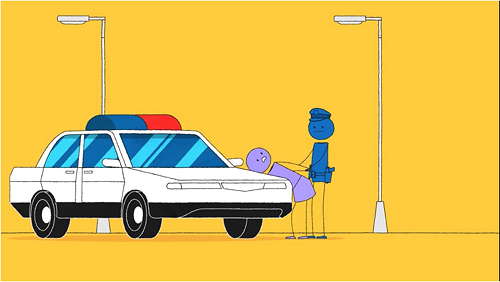
SB 357 officially goes into effect, repealing “Loitering for the Purpose of Prostitution” laws in California.
DSW Newsletter #44 (January 2023)
DSW Attends Adult Video News Awards in Las Vegas
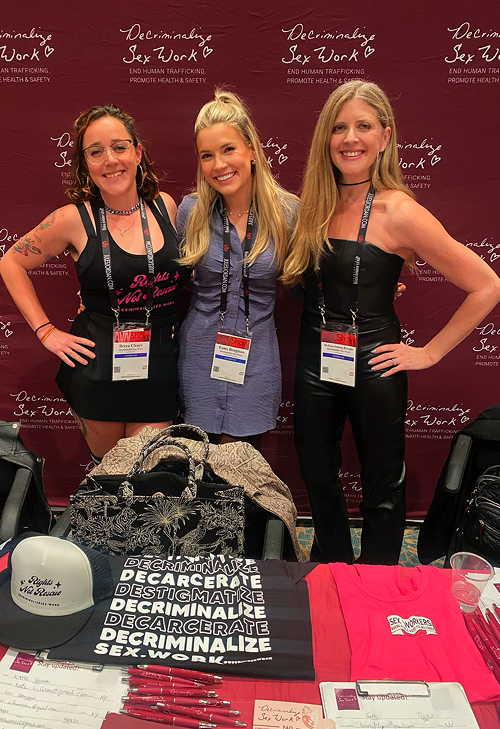
California Repeals Anti-Prostitution Loitering Law
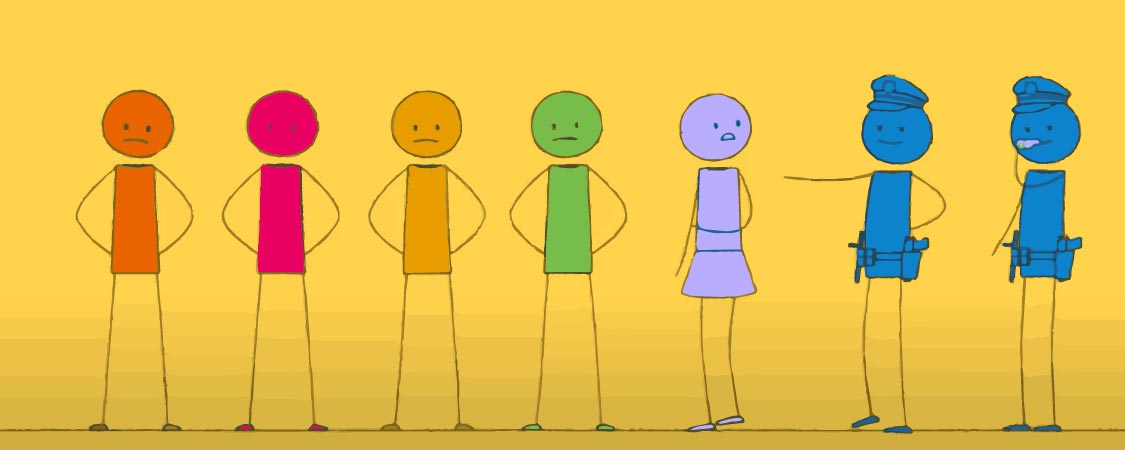
United States Appeals Court Hears Arguments Against SESTA/FOSTA
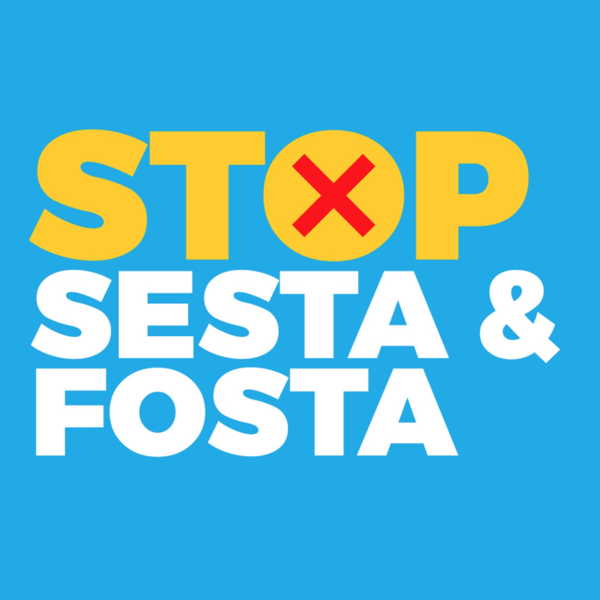
DSW and Allies Celebrate START Act Anniversary

DSW Newsletter Archive
A Long Overdue Bill Repealing the “Walking While Trans Ban” Heads to Gov. Newsom’s Desk
June 20, 2022
Nine months after passing the legislature, a bill that would repeal a provision of California law that prohibits “loitering in public for the purpose of engaging in prostitution” is in Governor Newsom’s hands. He can veto or sign the bill into law — or let it become law without his signature. DSW was proud to collaborate with a broad coalition of groups and individuals to repeal New York State’s “Walking While Trans Ban” in February 2021. We applaud California advocates for their hard-fought victory in the state legislature and urge Gov. Newsom to sign the bill into law to bring a measure of relief to individuals who have been marginalized and persecuted for far too long.
The repeal of “loitering laws” now known as “Walking While Trans Bans” is long overdue in California and across the nation. “Loitering for the Purpose of Prostitution” (LPP) is a tool for discrimination rather than community safety. Loitering laws give police permission to profile, harass, and arrest individuals for non-criminal activities. As with stop-and-frisk and other loitering charges, individuals are not arrested for what they are doing, but for who they are. LPP is a violation or misdemeanor in multiple states and municipalities across the U.S. Statutes often define the charge generally as wandering, remaining, or spending time in a public space with the intention of committing a prostitution offense or promoting prostitution.
LPP is a discriminatory statute used by law enforcement to profile and harass individuals based on their race, gender, and/or stereotypes of what a prostitute looks like. Laws that prosecute intent — rather than action — allow law enforcement to enforce violations at their discretion, threatening equal protection under the law. As “stop-and-frisk” policies have been used to profile Black and Latinx individuals, LPP gives law enforcement an avenue to exercise disproportionately discriminatory profiling of transgender and cisgender women of color.
The history of the criminalization of LPP is one of discrimination and discretion used to target and control low-income women. The Chamberlain-Kahn Act of 1918, also known as the American Plan, implemented a public health program with the stated goal of combatting the spread of sexually transmitted infections amongst soldiers in the United States during World War I. In this “Forgotten War on Women,” the Chamberlain-Kahn Act allowed for the arrest and imprisonment of any woman who could be “reasonably suspected” of having a sexually transmitted infection (STI). A disproportionate number of those arrested were working-class women and women of color who were viewed as “a threat to soldiers’ moral hygiene.”
Under the American Plan, transgender and cisgender women were arrested and given invasive exams on the basis of poverty, racial profiling, rumors of prostitution, their dress being perceived as “morally questionable,” or simply walking alone in the wrong place at the wrong time. These exams were used as a pretense to convict women of prostitution and send them away for “rehabilitation.” The Chamberlain-Kahn Act continued to be enforced through the 1970s.
LPP laws and loitering statutes in general have been used to target people of color, transgender individuals, and those with previous convictions for occupying public spaces. Defendants across the country are overwhelmingly women, both transgender and cisgender. The specific focus on transgender women, and the impact of these laws, has been well documented. The Sylvia Rivera Law Project, based in New York City, found that 80% of its clients who identified as transgender women of color had experienced police harassment or false arrest based on suspicion of prostitution, often resulting in a conviction.
Like other laws that contribute to profiling for low-level offenses, LPP contributes to the revolving door of involvement in the criminal justice system. Individuals arrested once for a specific crime are then targeted over and over again as a result of their record.
Contact with the criminal legal system traps individuals in a cycle of fines, jail, and court dates that can be difficult to escape. In cases where there is no victim, individuals should not be saddled with the burden of a record that prevents them from accessing housing, employment, and other opportunities.
Watch and share our short video on LPP here.

DSW Newsletter #37 (June 2022)
Burlington’s Vote To Strike Language on Sex Work From City Charter Becomes Law

DSW Research and Project Manager Testifies at Legislative Study Commission
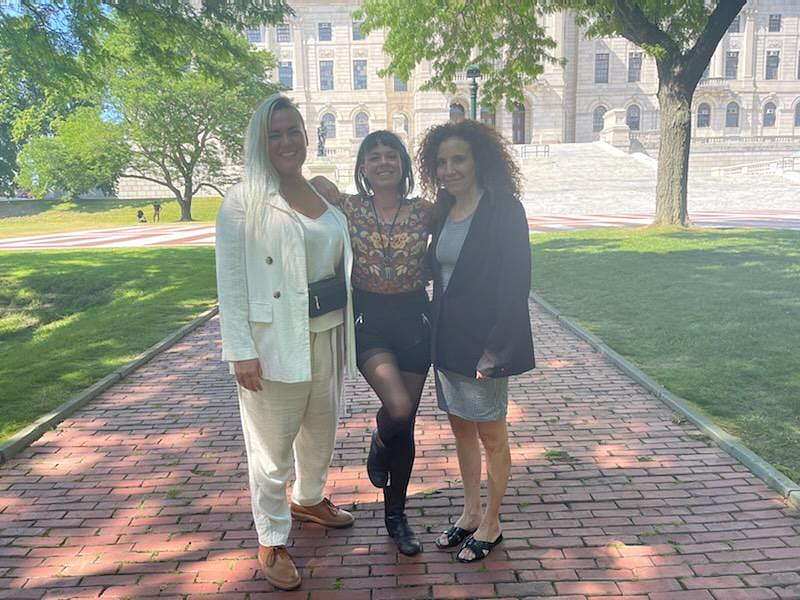
A Long Overdue Bill Repealing the “Walking While Trans Ban” Heads to Gov. Newsom’s Desk

DSW Staff Commemorates Pride

DSW Newsletter Archive
Key Committee OKs CA Senator Scott Wiener’s Bill to Decriminalize Sex Work-Related Loitering | The Davis Vanguard
Legislation to repeal “loitering for purpose of prostitution” law introduced | Los Angeles Blade
San Fran honors Margo St. James as N.Y. pols, feminists debate decriminalizing prostitution | The Village Sun
Hero(es) of the Month: Honoring the Dancers of the Lusty Lady
September 1, 2020
In 1996, the Lusty Lady in San Francisco became the first strip club in the country to successfully unionize, making history for the entire informal labor sector, including sex work. Despite the club’s closure in 2013, “Lusties,” as the dancers call themselves, remain a symbol of resilience and empowerment in an industry so often criticized for exploitation.
Siobhan Brooks, a dancer in the Lusty Lady peep show who went on to earn her Ph.D. in Sociology, played a pivotal role in unionization. Brooks observed that the club hired very few women of color and rarely allowed Black women to work in the private booth section, where dancers made larger tips. She raised her concerns with management and was told that "[B]lack women make the club lose money." In response, Brooks filed a racial discrimination complaint with the Equal Employment Opportunity Commission. Employees voted in favor of unionizing, and the club was organized by the Exotic Dancers Union, an affiliate of Service Employees International Union (SEIU). The next year the Lusty Lady hired more Black women than it ever had before. Brooks later authored “Organizing From Behind the Glass,” an account of the successful unionizing effort, for the January 1997 issue of Z Magazine.
In 2001 Roger Forbes, a strip-club magnate and partner in Déjà Vu, a company that owns most of the adult theaters and clubs in San Francisco, bought the building and doubled the rent. The owners were facing incredible pressure to close. In response, dancers at the Lusty Lady pooled together $400,000 and purchased the club. For the next 10 years, the Lusty Lady functioned as a worker-run cooperative known for defying stereotypes of tanned, blonde strippers favored by traditional club management.
The Lusties are the inspiration for a growing number of “Stripper Strikes” across the country. In Minneapolis, New York City, Portland, and beyond, dancers began organizing to oppose racist hiring practices, wage theft by management, and a lack of labor and safety protection in clubs. We Are Dancers USA, a national harm-reduction and advocacy organization, was founded in 2018 to empower strippers across the country in response to a gap in resources tailored explicitly to dancers. The organization grew out of We Are Dancers NYC, a local organization founded by dancers and allies, including DSW’s Melissa Broudo.
The NYC Stripper Strike partnered with Broudo and DSW colleague Crystal DeBoise to raise awareness around discrimination and exploitation in city clubs, gaining support from the International Women’s Strike. In response to a report by the Minneapolis Health Department that raised concerns about many city clubs, SWOP Minneapolis partnered with Minnesota State University to successfully pass a city ordinance protecting strippers’ rights in 2019. In Portland, the Haymarket Pole Collective’s grassroots activism has spurred the city’s clubs to adopt mandatory anti-racism training, enforce fair labor practices, and maintain racial equity in hiring practices.
DSW is proud to be a part of the Lusty Lady’s legacy, building equity and empowerment for all workers.
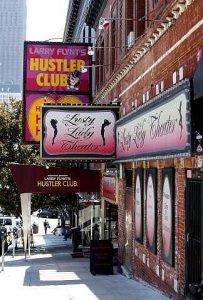
The facade of the Lusty Lady in San Francisco shortly before the club closed in 2013. (Photo: Sarah Rice, Special to The Chronicle, 2013)

Siobhan Brooks, a former dancer at the Lusty Lady, is now an associate professor of African American studies at California State University, Fullerton, and continues to advocate for sex worker rights. (Photo: NY Times, 2019)
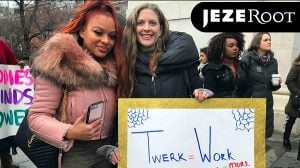
Gizelle Marie (left), founder of the NYC Strippers Strike, marches for stripper labor rights with DSW’s Melissa Broudo. (Photo: SOAR Institute, 2018)
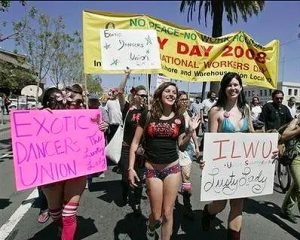
Performers from the Lusty Lady represent the Exotic Dancers Union at the 2008 May Day March in San Francisco. (Photo: LA Times, 2008)
DSW Newsletter #18 (September 2020)
Hero(es) of the Month: Honoring the Dancers of the Lusty Lady
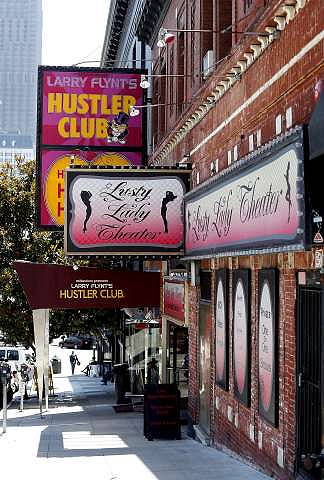
The Second Anniversary of Sex Worker Pride

De Blasio To Change NYC Sex Work Policy
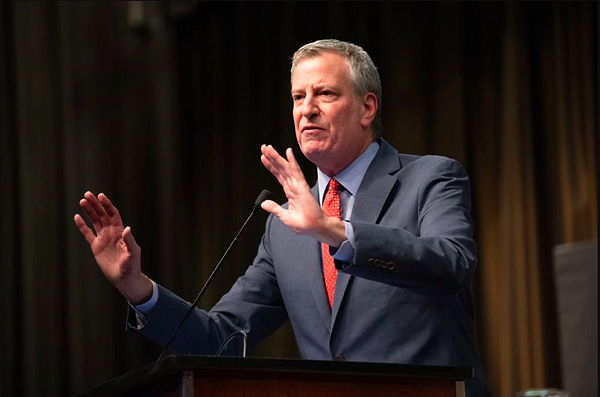
OnlyFans’ New Policy Endangers Sex Workers During COVID-19

DSW’s Melissa Broudo Featured in Film Series on Inspirational Women

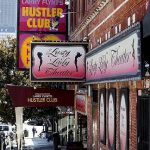
Hero(es) of the Month: Honoring the...

The Second Anniversary of Sex Worker...

De Blasio To Change NYC Sex...

OnlyFans’ New Policy Endangers Sex Workers...

DSW’s Melissa Broudo Featured in Film...
